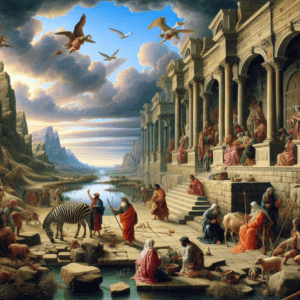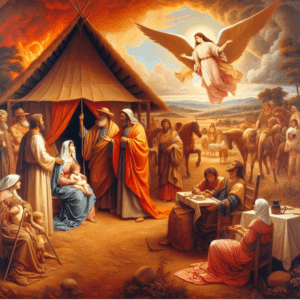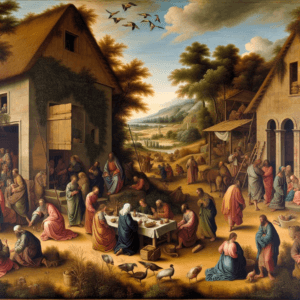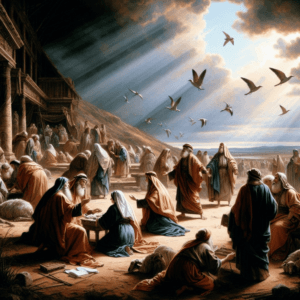Abraham And Abimelech At Beer-Sheba part-1
Abimelech felt sure that the promises of God would be fulfilled to Abraham. It is wise to connect ourselves with those who are blessed of God; and we ought to requite kindness to those who have been kind to us.
After Hagar and Ishmael have gone, Abimelech, king of Gerar, approaches Abraham. In spite of the fact that Abraham’s deception about Sarah being his wife nearly led to Abimelech’s death, the king has noticed that God is with Abraham.
He has respect for God’s power and His blessing of all that Abraham does. Previously Abimelech has given to Abraham animals, servants, silver, and the land Abraham has been occupying.
Now Abimelech would like to formalize their relationship, giving Abraham a permanent home in his region and becoming official allies (Genesis 21:22–24).
Abraham agrees to Abimelech’s request to swear not to deceive him or his offspring ever again, and to deal kindly with him and his people.
Abraham insists on including in their agreement the resolution of the ownership of a disputed well, one Abraham himself had dug.
Genesis 21:22-27 KJV
[22] And it came to pass at that time, that Abimelech and Phichol the chief captain of his host spake unto Abraham, saying, God is with thee in all that thou doest:
[23] Now therefore swear unto me here by God that thou wilt not deal falsely with me, nor with my son, nor with my son’s son: but according to the kindness that I have done unto thee, thou shalt do unto me, and to the land wherein thou hast sojourned.
[24] And Abraham said, I will swear.
[25] And Abraham reproved Abimelech because of a well of water, which Abimelech’s servants had violently taken away.
[26] And Abimelech said, I wot not who hath done this thing: neither didst thou tell me, neither yet heard I of it, but to day.
[27] And Abraham took sheep and oxen, and gave them unto Abimelech; and both of them made a covenant.
Genesis 21:22 KJV
And it came to pass at that time, that Abimelech and Phichol the chief captain of his host spake unto Abraham, saying, God is with thee in all that thou doest:
 Here a proof of the promise (Genesis 12:2) being fulfilled, in a native prince wishing to form a solemn league with Abraham. The proposal was reasonable, and agreed to [Genesis 21:24 ].
Here a proof of the promise (Genesis 12:2) being fulfilled, in a native prince wishing to form a solemn league with Abraham. The proposal was reasonable, and agreed to [Genesis 21:24 ].
Abimelech is the king of Gerar. He and Abraham had met under difficult circumstances, as described in Genesis 20. In short, Abraham had lied about Sarah not being his wife (Genesis 20:2).
Abimelech had taken her for his own wife only to be struck with an illness and threatened with death by Abraham’s God (Genesis 20:3–6).
After confronting Abraham about the reasons for his lie, Abimelech had returned Sarah to Abraham, untouched, along with gifts of animals, servants, silver, and the land upon which Abraham was now settled (Genesis 20:8–15).
Apparently, realizing how abundantly God was blessing Abraham, now including the miraculous birth of a promised child, Abimelech set aside any lingering resentment over the incident and hoped to become Abraham’s formal ally.
He brought with him the commander of his army and opened by stating flatly that it was apparent to him that God was with Abraham in everything he did.
Having spoken to God himself in a dream, Abimelech had firsthand reason to be impressed with the level of God’s favor for Abraham.
Genesis 21:23 KJV
Now therefore swear unto me here by God that thou wilt not deal falsely with me, nor with my son, nor with my son’s son: but according to the kindness that I have done unto thee, thou shalt do unto me, and to the land wherein thou hast sojourned.
 In other words, Abimelech wants to make a contract or a treaty with this man Abraham—and they become good friends because of this. Abimelech, king of Gerar, approached Abraham in hopes of formalizing their relationship in his kingdom.
In other words, Abimelech wants to make a contract or a treaty with this man Abraham—and they become good friends because of this. Abimelech, king of Gerar, approached Abraham in hopes of formalizing their relationship in his kingdom.
Abimelech understood that Abraham’s God was powerful and was committed to blessing Abraham in all he did. Abimelech wanted to have a good relationship with Abraham and share in that blessing.
To that end, Abimelech came with a request that Abraham would swear to several things by God. First, he asked Abraham to swear not to be deceptive with him or his descendants or even those who would come after.
Abimelech pictured a long relationship between his own people and Abraham’s people in the land of his kingdom. Abimelech had reason to be wary of Abraham’s deceptiveness.
Abraham’s lie about not being married to Sarah had nearly cost Abimelech his life when God struck him with an illness after taking Sarah for his own wife (Genesis 20:3–11).
On the positive side, Abimelech also asked Abraham to swear to deal kindly with him and with the land, in the same way that Abimelech had already been kind to Abraham. The following verse contains Abraham’s reply.
Genesis 21:24 KJV
And Abraham said, I will swear.
 The oath of peace between Abimelech (and his people) and Abraham was agreed to by Abraham. Abimelech, king of Gerar, has asked Abraham to swear to a several things as a way of formalizing an agreement between them.
The oath of peace between Abimelech (and his people) and Abraham was agreed to by Abraham. Abimelech, king of Gerar, has asked Abraham to swear to a several things as a way of formalizing an agreement between them.
Abimelech had previously given to Abraham the land upon which he and his household were now living. He had seen that Abraham’s God is with him in everything. This would have included the miraculous birth of Abraham’s son, Isaac, through his wife, Sarah.
Abimelech asked, in essence, that Abraham would swear not to deceive him or his descendants. This provision is made because of the lie Abraham told earlier about Sarah, which nearly cost Abimelech his life (Genesis 20:3–11).
Abraham is also asked to swear to act kindly toward Abimelech and the land, in this case meaning the kingdom. Abimelech seems to want to be included in, or least associated with, the blessings Abraham has obtained from God.
Now Abraham replies with what seems to be a short, blunt reply. As the next verse will reveal, Abraham has a complaint he wants to address with Abimelech.
Genesis 21:25 KJV
And Abraham reproved Abimelech because of a well of water, which Abimelech’s servants had violently taken away.
 Abraham has agreed to swear before God to several things Abimelech has asked about, including not deceiving him and dealing kindly with him and his kingdom. The provision for honesty is the result of Abraham’s own deception.
Abraham has agreed to swear before God to several things Abimelech has asked about, including not deceiving him and dealing kindly with him and his kingdom. The provision for honesty is the result of Abraham’s own deception.
Earlier, Abraham and Sarah had caused great trouble for Abimelech’s household by hinting that they were not actually married (Genesis 20:3–11). Abimelech treated Abraham well, given all of this, but still wants to encourage Abraham’s honesty.
Now though, Abraham raises an issue that has been bothering him. Abimelech’s servants had seized a well of water from Abraham, one we will soon learn that Abraham dug himself. Water, of course, was of vital importance in this part of the world.
Without a reliable source of water, Abraham could not hope to remain in Abimelech’s kingdom. Abraham was understandably upset that Abimelech’s men had seized his well. He believed himself to be the owner of the well.
Why would Abimelech’s men do this?
Abimelech will respond in the following verse.
Genesis 21:26 KJV
And Abimelech said, I wot not who hath done this thing: neither didst thou tell me, neither yet heard I of it, but to day.
 Abimelech, the king of Gerar, has approached Abraham with a proposal. The king wishes to create a formal agreement with Abraham, seemingly in order to gain some benefit from Abraham’s blessings from God.
Abimelech, the king of Gerar, has approached Abraham with a proposal. The king wishes to create a formal agreement with Abraham, seemingly in order to gain some benefit from Abraham’s blessings from God.
After agreeing to swear before God not to deceive Abimelech again and only to deal kindly with him, Abraham immediately presented a grievance: A well that Abraham had dug and rightly felt belonged to him had been seized by Abimelech’s men.
Here, Abimelech insists he didn’t know anything about this issue. He didn’t even know which men had seized the well. This was all new information to him. This is similar to his claims that he was unaware of Sarah’s marriage to Abraham in chapter 20.
We’re not told how or if Abimelech offered to resolve the issue, though the men continue with their covenant, so Abimelech clearly planned to return the well to Abraham and his men. Abraham will specifically include this well in the oath, described in the following verses.
Genesis 21:27 KJV
And Abraham took sheep and oxen, and gave them unto Abimelech; and both of them made a covenant.
 The oath of peace between Abimelech (and his people) and Abraham was then sealed by the transfer to Abimelech of sheep and oxen. Abimelech, king of Gerar, had approached Abraham to make a covenant meant to formalize their relationship.
The oath of peace between Abimelech (and his people) and Abraham was then sealed by the transfer to Abimelech of sheep and oxen. Abimelech, king of Gerar, had approached Abraham to make a covenant meant to formalize their relationship.
Abraham was living in Abimelech’s land, at his invitation, in spite of Abraham’s earlier deception (Genesis 20). Abraham has agreed to swear not to deceive Abimelech and to deal kindly with him.
At the same time, Abraham has expressed his concern that Abimelech’s men have taken his well. A water source, which Abraham had established, had been captured by men under Abimelech’s command.
Abimelech claims he knows of no such incident, and agrees to return the rights to this well to Abraham. Now Abraham gives to Abimelech sheep and oxen as a sign of this covenant between them.
In the following verses, he will give additional sheep specifically to show a clear resolution to the issue of the disputed well.

Abraham And Abimelech At Beer-Sheba part-2
Abraham insists on including in their agreement the resolution of the ownership of a disputed well, one Abraham himself had dug. He gives seven additional lambs to Abimelech as a sign that the well does indeed belong to Abraham (Genesis 21:25–30).
After they both swear their oaths to bind the agreement, the place where they met is called Beersheba, which means “well of seven” or “well of the oath.” It becomes an important place in Israel’s history (Genesis 21:31–34).
As Genesis 21 concludes, Isaac has been born and Abraham owns a well in Canaan. The promises of God to make of him a great nation and to give to him possession of the entire land have begun to come true.
Still ahead, however, is the greatest test of all Abraham has learned about God, a dire request which seems to threaten this promised son.
Genesis 21:28-34 KJV
[28] And Abraham set seven ewe lambs of the flock by themselves.
[29] And Abimelech said unto Abraham, What mean these seven ewe lambs which thou hast set by themselves?
[30] And he said, For these seven ewe lambs shalt thou take of my hand, that they may be a witness unto me, that I have digged this well.
[31] Wherefore he called that place Beer–sheba; because there they sware both of them.
[32] Thus they made a covenant at Beer–sheba: then Abimelech rose up, and Phichol the chief captain of his host, and they returned into the land of the Philistines.
[33] And Abraham planted a grove in Beer–sheba, and called there on the name of the LORD, the everlasting God.
[34] And Abraham sojourned in the Philistines’ land many days.
Genesis 21:28 KJV
And Abraham set seven ewe lambs of the flock by themselves.
 The Hebrew is not clear as to whether the seven ewe lambs were part of the gift mentioned in v. 27 or an additional gift. Abraham has already given to Abimelech oxen and sheep as a sign of the formal covenant sealing their relationship.
The Hebrew is not clear as to whether the seven ewe lambs were part of the gift mentioned in v. 27 or an additional gift. Abraham has already given to Abimelech oxen and sheep as a sign of the formal covenant sealing their relationship.
Abraham will live in the land of Abimelech’s kingdom in good faith, dealing kindly with all and not again deceiving Abimelech, or his offspring. Part of this agreement deals with the rights to a well, which Abraham had dug (Genesis 21:25).
Now Abraham sets aside seven additional sheep, ewe lambs, for a specific purpose related to this covenant. In the next verses, he will explain how these sheep will signify the true ownership of this well.
Genesis 21:29 KJV
And Abimelech said unto Abraham, What mean these seven ewe lambs which thou hast set by themselves?
 The significance of seven in Hebrew thought was completion-hence indicating the “completion,” or “sealing,” of the oath. Abraham and Abimelech have been discussing a formal covenant to solidify their relationship.
The significance of seven in Hebrew thought was completion-hence indicating the “completion,” or “sealing,” of the oath. Abraham and Abimelech have been discussing a formal covenant to solidify their relationship.
This has included provisions that Abraham be honest with Abimelech and his descendants—inspired by Abraham’s own dishonesty regarding Sarah (Genesis 20:3–11).
Abraham agreed to this idea, but also brought up the issue of a well which he had dug, and which Abimelech’s men had captured (Genesis 21:25). The covenant process, so far, has included the exchange of animals.
In addition to the more general covenant of friendship between Abraham and Abimelech, Abraham set aside seven ewe lambs. Now Abimelech asks what this is about.
What is the meaning of these seven lambs?
The following verses will reveal that these lambs are Abraham’s attempt to resolve the issue of a disputed well.
Genesis 21:30 KJV
And he said, For these seven ewe lambs shalt thou take of my hand, that they may be a witness unto me, that I have digged this well.
 The Hebrew word for “seven” and “oath,” in fact, is the same (sheva‘), as reflected in the name of the well.
The Hebrew word for “seven” and “oath,” in fact, is the same (sheva‘), as reflected in the name of the well.
In addition to giving Abimelech sheep and oxen as a sign of the broad covenant between them to treat each other agreeably, Abraham has set aside seven ewe lambs for a specific purpose.
Here, in verse 30, he reveals their exact purpose. He wants Abimelech to take the lambs as a witness that he dug the well that is in dispute between them.
Earlier, Abraham complained about Abimelech’s men taking over a water source which he had dug (Genesis 21:25).
In broad terms, Abraham is offering to formally buy back his own well, in order to once and for all resolve the issue of who it belongs to. Abimelech apparently agrees to this, and the two swear their oaths in the following verse.
Genesis 21:31 KJV
Wherefore he called that place Beer–sheba; because there they sware both of them.
 Eventually the town over which the oath was made-i.e., Beersheba (be’er sheva‘), which bears the complementary (not contradictory) meanings, “Well of the Oath” and “Well of the Seven.”
Eventually the town over which the oath was made-i.e., Beersheba (be’er sheva‘), which bears the complementary (not contradictory) meanings, “Well of the Oath” and “Well of the Seven.”
The formal treaty between Abraham and Abimelech seems to have been significant enough to warrant changing the name of the well involved in the transaction. Beersheba means “well of seven” or “well of the oath.”
The two men swore their oaths in that place, giving Abraham the official ownership of a well in the land of Canaan. Their agreement also included a promise for their respective households to treat each other agreeably.
Abimelech had originally been the one to approach Abraham, seeking to benefit from Abraham’s favor with God. The taking of an oath is a significant event in the Bible. God’s Law would command His people to always keep their oaths, at any cost.
Jesus would later tell Christians to avoid taking oaths, to prevent even the possibility of breaking them. Instead, we must be so trustworthy that our “yes” and “no” require no additional swearing to be believed (Matthew 5:34–37; James 5:12).
Genesis 21:32 KJV
Thus they made a covenant at Beer–sheba: then Abimelech rose up, and Phichol the chief captain of his host, and they returned into the land of the Philistines.
 Abraham alone gave gifts and not Abimelech suggests that Abraham was the supplicant in this treaty. Moreover, the entire narrative portrays Abraham as dwelling in Philistine land and therefore still awaiting the fulfillment of God’s promises.
Abraham alone gave gifts and not Abimelech suggests that Abraham was the supplicant in this treaty. Moreover, the entire narrative portrays Abraham as dwelling in Philistine land and therefore still awaiting the fulfillment of God’s promises.
A solemn treaty between Abimelech, king of Gerar, and Abraham has just been completed. Abimelech and Abraham have exchanged animals as part of an agreement for their households to treat each other agreeably.
Abraham has also claimed formal ownership of the well he dug, and which was taken at some point by men serving under Abimelech. His symbolic price for these rights was seven sheep.
This agreement was significant enough that the name of the well’s location was changed to Beersheba, meaning “well of the oath” or “well of seven.” Now Abimelech and Phicol, the commander of his army, return home.
We’re told that Gerar is located in the land of Philistines. These Philistines may have been the forerunners to those who would later plague Israel in the time of Saul and David.
Or, the text may be saying that Gerar was in a region which would later be occupied by the Philistines.
Genesis 21:33 KJV
And Abraham planted a grove in Beer–sheba, and called there on the name of the LORD, the everlasting God.
 Abraham is calling upon God’s name everywhere he goes. In prior verses, Abraham formally accepted a covenant with Abimelech, the king of Gerar (Genesis 21:22–24).
Abraham is calling upon God’s name everywhere he goes. In prior verses, Abraham formally accepted a covenant with Abimelech, the king of Gerar (Genesis 21:22–24).
As part of this agreement, Abraham gave seven sheep to Abimelech to absolutely secure his right to a particular well. Abraham had dug this water source himself, but Abimelech’s men, at some point, had taken it over (Genesis 21:25).
Having secured the ownership rights to the well at Beersheba, Abraham further puts down roots, so to speak, by planting a tamarisk tree. Tamarisk trees could reach 30 feet high and would provide excellent shade in the desert climate of the region.
The planting of a tree required a reliable water source, and this further symbolizes the importance of this location. The planting of this tree may have been related to Abraham’s calling on the name of “El-Olam,” the Everlasting God.
Much later, Abraham’s son Isaac would meet the Lord here at Beersheba and build and altar to Him. Beersheba becomes a significant spot for Israel’s patriarchs and the nation.
Genesis 21:34 KJV
And Abraham sojourned in the Philistines’ land many days.
 We are told later that Abraham was always a stranger and a pilgrim in this land that God had promised to him, and this is an evidence of it.
We are told later that Abraham was always a stranger and a pilgrim in this land that God had promised to him, and this is an evidence of it.
Earlier in Genesis, God had promised to make Abraham a great nation and to give to Abraham’s descendants all of the land of Canaan (Genesis 12:1–3). For much of Abraham’s life, that seemed very unlikely, at least from a human perspective.
Now, though, it had at least begun. Isaac had been born, a miraculous birth to a married couple decades beyond normal child-rearing ages (Genesis 21:1–3).
Abraham now formally owned a well in Canaan, and had come to a covenant agreement with the king of Gerar, Abimelech (Genesis 21:22–31).
Abraham continued to live in this region of Beersheba for “many days.” This area is called “the land of the Philistines.” This may be because the people who lived there in Abraham’s day were the ancestors of those later to be called Philistines.
It is also possible that the writer is referring to this region by the name of those who would later occupy it.
I hope that you have really enjoyed this post,
Please Leave All Comments in the Comment Box Below ↓













Abraham was a very blessed man because he was connected with God and had God’s favor, he was obedient to God and tried his best to do that which was pleasing to God.
But what I find to be interesting was although Abraham had a connection with God there was still the human side of him because he told his wife to lie and to say she is my sister because of fear. This also shows us that no matter how close we are to God we are still in the flesh and that we need Gods grace to keep us, cover us and lead us as we go from day to day.
Hello Norman,
Thanks for stoppping by, and commenting on Abraham And Abimelech At Beer-Sheba – Fulfilled Promises.
Blessings My Friend!
Hi there,
Thank you for diving into the intriguing story of Abraham and Abimelech at Beer-Sheba and shedding light on the theme of fulfilled promises.
I appreciated the simplicity with which you unraveled the complexities of faith, trust, and divine intervention in their agreement.
Out of curiosity, how do you think the concept of making and fulfilling promises plays out in today’s fast-paced world compared to the slower, more deliberate pace of biblical times?
Your post made me ponder the value we assign to our words and commitments nowadays.
Thank you for your work and sharing your insights.
Best regards,
Max
Hello Makhsud,
Welcome back to the HBS & DwJ platform.
Trusting GOD often requires not knowing how GOD is going to accomplish what needs to be done and not knowing when He will do it. We often say God is never late, but generally He isn’t early either.
Why?
Because He uses times of waiting to stretch our faith in Him and to bring about change and growth in our lives.
Thanks for continuing to bless the HBS & DwJ platform with your presence.
Blessings My Friend!
Thanks for this deep dive into Abraham and Abimelech At Beer-Sheba and the fulfilled promises between the 2 men.
I do understand that Abraham had Sarah lie out of fear, but that lie was a great one that almost cost Abimelech his life. Luckily there was a reconciliation on the matter.
Just goes to show that even a man of God is still human by nature.
Stacie
Hello Stacie,
Thank You for commenting on this episode of HBS & DwJ.
Blessings My Friend!
This is a very detailed and informative explanation of the covenant between Abraham and Abimelech.
After reading this article, I now have a much clearer picture of what happened between the two men. It is interesting that although Abraham was a man of God, he lied to Abimelech about Sarah being his wife. And Abimelech noticed that God was blessing Abraham, although he had lied about Sarah.
Thank you for sharing this helpful resource.
Hello LineCowley,
Thanks for continuing to stop by and comment on these articles, turned podcast episodes.
Blessings My Friend!!!
You have laid out this story so clearly.
The symbol of the well as the agreement between Abraham and Abimelech. And his desire to be an ally of Abraham because Abraham was favored by God.
Although the new Testament lays out the importance of righteous action before the world, there does not seem to be any indication that the faith of one person can be transferred to the another simply by association. Following the example of a righteous person is basically where the story of Abraham and Abimelech leads I think.
It is great to have these old testament passages opened up in light of the gospel.
Thanks,
Jim
Hello Jim,
Thank you for your comment on this episode of HBS & DwJ, as well as, your reiteration of Abraham’s circumstances in this information.
Blessings My Friend!